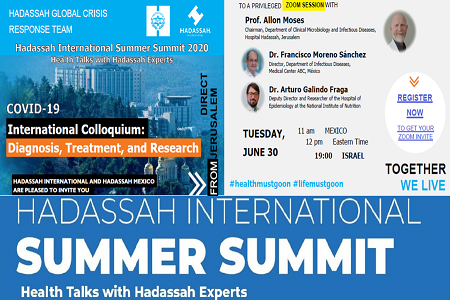
As frightening numbers of new COVID-19 cases plague Israel, Prof. Allon Moses, international infectious disease expert, and immediate past director of the Hadassah Medical Organization’s Department of Clinical Microbiology and Infectious Diseases explained, “This is not a second wave. It is the result of lifting the lockdown.”
Prof. Moses shared his sobering perspective as part of a June 30 Hadassah International virtual colloquium, where he was joined by two Mexico City colleagues, Dr. Francisco Moreno Sánchez, director of the Department of Infectious Diseases at ABC Medical Center, and Dr. Arturo Galindo Fraga, deputy director and researcher at the National Institute of Medical Sciences and Nutrition, to discuss COVID-19 diagnosis, treatment, and research.
Prof. Moses described how Israel’s strict lockdown resulted in “a fantastic drop in the number of cases.” For a few weeks, Israel saw no more than 10 new cases daily. But, as lapses in social distancing began to accelerate and more Israelis returned to their workplaces, Israel witnessed an increase to about 400 new cases a day.
Dr. Sánchez reported that Mexico, a much larger country than Israel, is number 11 in the world by the number of cases, and COVID-19 has not yet peaked there. He noted one problem he and his colleagues faced was that at ABC Medical Center patients came in with severe pneumonia and yet they tested negative for COVID-19. This made CT scans of the lungs extremely important, he said. Complicating the situation was that patients came to the hospital much too late. As he explained, patients don’t notice a significant drop in their oxygen levels because often it happens gradually. As a result, they don’t realize they need to come to the hospital for help earlier.
Dr. Fraga said that the number of COVID-19 patients in his hospital is decreasing but that his patients tend to be younger—an average age of 40— than at the ABC Medical Center. He noted, though, that all of the patients have underlying problems, particularly obesity and/or diabetes.
All three presenters acknowledged that while some medications appear to help some patients, such as early use of the steroid dexamethasone and, for more severely ill patients, the anti-viral drug remdesivir, there is as yet no real evidence of efficacy with any treatment. There is also no clarity as to how much protection antibodies provide, Dr. Sánchez said. Prof. Moses is optimistic that recovered COVID-19 patients who have antibodies will be safe from reinfection, at least in the short term.
“What is important now,” Prof. Moses emphasized, “is widespread testing and contact tracing.” While noting that Israel is doing well in expanding its testing, he also pointed out that Israel needs to decrease the amount of time it’s taking to get results. The goal, he said, must be to have results within 12 hours.
“The solution to this pandemic,” Prof. Moses explained, “will come from a vaccine, and we will be able to go back to a mostly normal life once there is one.” However, he said, developing a vaccine is a long process, and, in the meantime, we need to protect those who are vulnerable to severe illness. Israel is experiencing fewer patients with severe illness, he reported, because the elderly and other vulnerable populations are staying home.
The presenters also discussed the reliability of testing and the challenge of false negatives. Prof. Moses noted, however, that sampling error is often the culprit. For example, he said, sometimes the person swabbing the patient does not insert the swab deeply enough into the nostril. Other times, a patient may not excrete enough virus. When the sample is good, the PCR lab test is 95 percent accurate.
Looking to the future, Dr. Fraga said that he is considering how he will convert his fully COVID-19 patient hospital to a hybrid hospital that can safely treat patients with COVID-19 and those who don’t have the virus. Hadassah, too, is planning renovations that will better accommodate both types of patients.
Prof. Moses cautions, however, that, as scientists, he and his colleagues must stay alert to the arrival of new viral threats.
This webinar is part of the Hadassah International Summer Summit 2020 “Health Talks with Hadassah Experts.”
